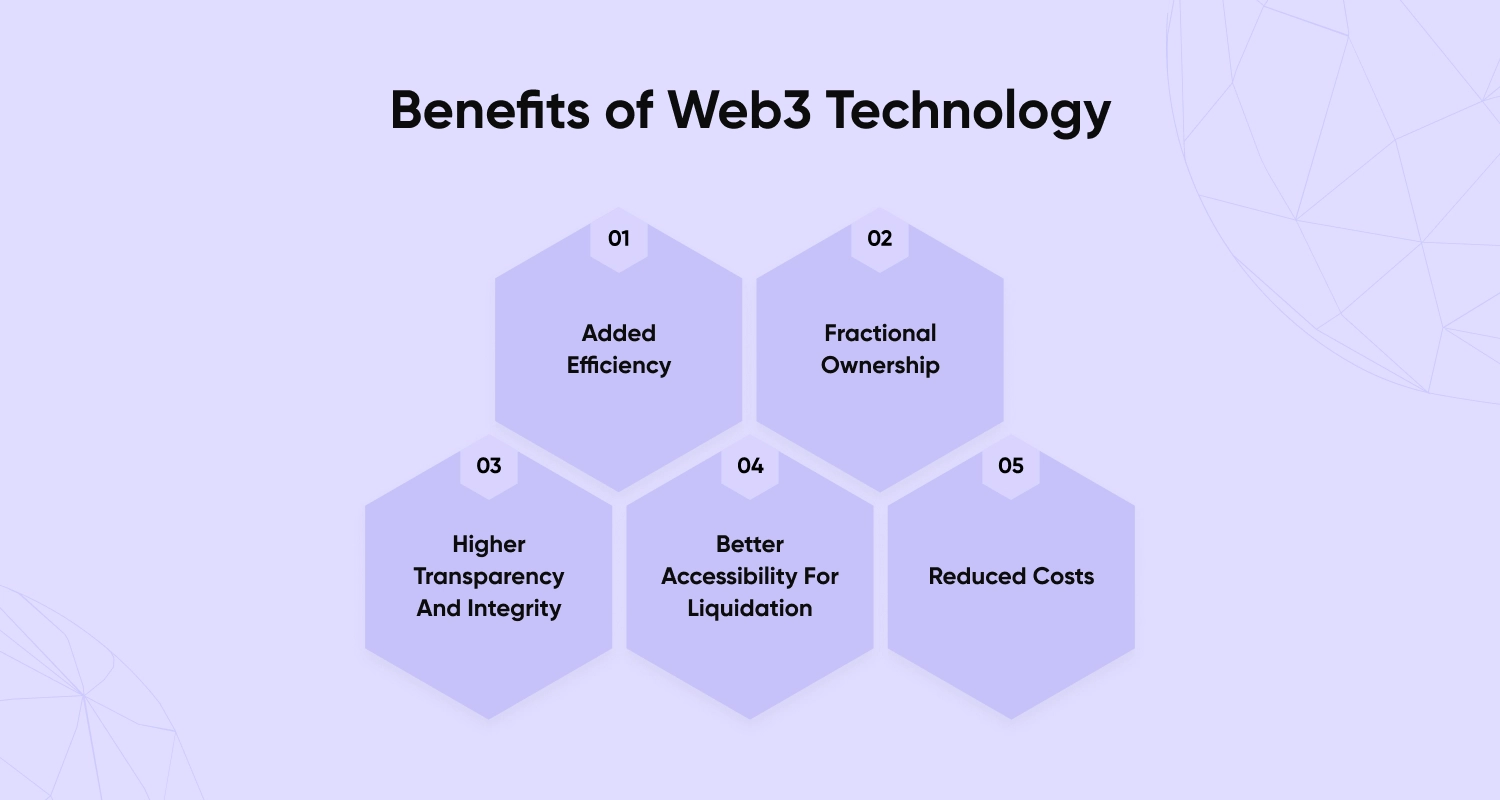In today’s world, technology has advanced a lot and brought the virtual world into reality. Gone are the days when buyers and investors needed to visit a property physically to buy or sell it. Now, with Web3 technology, transparency, and security are at the forefront and helped reshape the entire real estate industry. The groundbreaking Web3 technology and blockchain have helped realtors bring decentralized real estate into reality.
But, how is it possible and why are businesses investing in Web3 technology like blockchain, NFT, and cryptocurrency? Is it necessary to bring Web3 real estate into reality and what are its benefits? To help you better understand these concepts and reap the benefits of the Web3 technology, we have put together the article below. So, what are you waiting for? Jump right into it and learn how you can implement Web3 technology to build better real estate software solutions!
What Is Web3 Technology And Decentralization?
Web3 technology and decentralization are the industry’s top buzzwords and are increasingly gaining popularity. But, what do they mean and why are they gaining such huge traction? Let us look at what these terms mean to ensure you have a better understanding.
As evident from the name, Web3 refers to the third generation of the internet and is a vision that focuses on decentralization. Also known as the decentralized web, Web3 technology revolves around open-source technologies like blockchain which is a digitized ledger that maintains transactions and offers better transparency.
To help you better understand Web3 technologies, let us discuss what the term decentralization means. The term refers to the transfer of control and power from a central authority to a distributed network set. So, decentralized systems are not dependent on a single node or organization and are maintained across multiple nodes. Some common examples include open-source protocols and distributed ledgers which are also implemented in blockchain.
Although both of these terms might seem irrelevant to each other, they are closely related. Decentralization helps implement Web 3 technologies like blockchain that are supposed to be controlled over multiple systems. This paves the path for better transparency and added security while ensuring developers can create new technologies and implement applications.
Web3 Technology And Decentralized Real Estate
Although Web3 technology and decentralization can impact all major industries, real estate is the most important one. Want to know more about how Web3 real estate is brought to reality and the functionalities implemented? Check out the relevant technologies that disrupt the real estate industry and change the way properties are bought and sold.
Asset Tokenization
One of the most significant impacts of Web3 technology on real estate comes via tokenizing assets. The term refers to the process of creating digital tokens that help represent the ownership of any physical object in the real world.
In the case of real estate, the physical object generally refers to a piece of residential or commercial property. But, other than representing ownership, what other purposes do these tokens serve? Well, these digital tokens can be traded, sold off, and bought on blockchain-based, NFT marketplaces to replicate the buying and selling of physical properties. Investing in these tokens can help diversify your portfolio while ensuring you are not cheated out of the asset.
Smart Contracts
Another effect of Web3 technology on the real estate industry is the introduction of smart contracts that are self-executing contracts and replicate the paperwork associated with the buying and selling of properties. The difference is that this is a digitized form of agreement and contains the details of buyers and sellers in the form of code.
A huge benefit of smart contracts is that they allow businesses to automate the complete process of buying and selling real estate properties. So, real estate investment becomes easier, more transparent, and more accessible for both investors and buyers.
But, a point to remember is that completely removing the need for human expertise might lead to complications in certain cases. After all, human skill sets cannot be replaced by machines which is why intermediary lawyers and real estate agents are needed. This not only eliminates the potential for any risk but also ensures that both parties can go ahead with the deal without any hesitations.

Decentralized Finance
Also termed DeFi, decentralized finance refers to the ability to create financial products and offer services on blockchain-based platforms. It is one of the most notable impacts of Web3 technology on the world around us and allows investors to offer better alternatives to traditional real estate investments.
Transparent Property Listing
As of today, most properties listed on different marketplaces are owned privately and cannot be verified due to the absence of a central database. Moreover, traditional methods of tracking and maintaining property listings are cumbersome and inefficient. Relocating these listing services to a decentralized blockchain platform can help address these issues without much hassle. With a blockchain-based server, buyers will have access to a distributed ledger that offers accurate information and helps users go through the contract and policies securely.
Accessible Investments
As per traditional investment means, investing in real estate involves multiple properties which can make estate investment exclusionary and time taking. Web3 technology can help implement this process on the blockchain and make real estate investment more accessible. Another advantage is that Web3 real estate allows multiple buyers to invest in a property and co-own it. But, how is this possible? Well, an important characteristic of blockchain is that it allows partial ownership of assets and streamlines the process of managing co-owned properties.
Benefits Of Web3 Technology and A Decentralized Real Estate

Now that you have an idea about Web3.0 technology and blockchain, it is time to take a peek into the benefits of a decentralized real estate world. Some considerable Web3 benefits in the real estate industry include:-
1. Added Efficiency
With features like smart contracts, the complexity of the complete real estate buying and selling process, is reduced. Moreover, these utilize automation ensuring that the process is streamlined and does not consume much time. Another benefit is that smart contracts eliminate the need for intermediary parties which helps reduce extra costs which adds to the efficiency.
2. Higher Transparency And Integrity
Due to advancements in Web3 technology, realtors can list real estate properties on a decentralized ledger that is accessible to all parties involved. This means that buyers can easily verify property details and have access to the complete information without bearing any additional costs and fees. Since blockchain contains immutable data, real estate transactions are secure and cannot be modified. This ensures better transparency and adds to the integrity of the agreement between the parties involved.
3. Better Accessibility For Liquidation
The main problem of traditional real estate investment was the inability of buyers to invest in properties that were not in their local area. With Web3 technology, the complete process is digitized which helps erase these boundaries and allows buyers to invest in properties all across the world. Moreover, they can also co-own properties and sell off their digitized tokens when deemed necessary.
4. Fractional Ownership
As discussed, Web3 technology allows real estate investors to own a fraction of a property. This means that investors can easily buy properties that fit their budgets without needing to secure the total capital by themselves. Moreover, with the help of Web3 technology, parties can easily create and view agreements while ensuring better transparency.
5. Reduced Costs
Since Web3 technology helps realize a decentralized real estate world, the need for intermediaries is eliminated. Buyers and sellers can communicate directly and quickly enter into deals with the help of smart contracts. Also allows both parties to complete real estate transactions without the need for additional charges and overheads.
You may like this:Enterprises Adopt Blockchain For Digital Assets
Steps To Adopt Decentralization
It is clever that Web3 technology has significantly transformed the real estate industry and can help people embrace new technologies. To ensure that you are well prepared for this change, ensure that your team has a good grasp of these concepts and is on the same page as you. Some other steps that you must take to implement decentralization via Web3 technology are:-
Stay Up-To-Date
Although the concept of Web3 technology is easy, implementation without the help of expert blockchain developers can be difficult. So, the first step to implementing a decentralized real estate system is educating your team about these concepts. You must also keep an eye out for recent developments in this area to ensure your team can cater to evolving buyer needs. You can also get in touch with a company specializing in blockchain development to get the help needed to bring these applications into reality.
Implement Web3 Technology
Before you start developing software based on the concepts of Web3 technology, you must experiment with different pilot projects. This will help you test the feasibility of the projects and break down the benefits that Web3 technology can bring to the real estate industry. We recommend starting small and scaling up gradually to identify any future challenges and issues that must be addressed.
Create A Clear Roadmap
Another critical step before jumping into implementing Web3 technology concepts is the development of a clear roadmap. Your plan must outline the steps you must take and a breakdown of the resources and investment required to bring your project into reality. A clear roadmap will help you better navigate the real estate market and ensure you are on the right track to achieving your investment goals.
Top Practical Applications Of Web3 Technology
Now that we have discussed the important aspects you need to consider before investing in Web3 technology, let us look at the top practical applications.
Property Ownership Through NFTs
Tokenization, a key characteristic of Web3 technology, can be implemented with the help of non-fungible tokens (NFTs). These tokens allow investors to maintain their ownership details and boost the market liquidity.
Smart Contracts For Transaction Automation
As discussed, smart contracts are a great way to simplify the complete real estate investment process and can help offer better transparency. Moreover, they eliminate the need for intermediate parties which further helps reduce complications and implementation costs.
Real Estate Assets Tokenization
Asset tokenization is the major USP of Web3 technology and helps investors manage real-estate properties and investments with ease. They also bring in other benefits like fractional ownership and ownership transparency which is exactly why Web3 technology is so popular.
Real Estate Marketplaces
Similar to any real-estate selling and buying platform, Web3 technology implements a decentralized and peer-to-peer marketplace investment system. These platforms are also feature-rich and better connect buyers, sellers, and real estate agents. Moreover, these marketplaces implement features like smart contracts that further help boost the efficiency and transparency of real estate investment.
You may like this: How To Hire NFT Developers?
Final Thoughts
Web3 technology in real estate addresses the major issues of the traditional industry and modifies it for the better. Not only does it remove the need for intermediaries, but also allows investors to find better deals and add variety to their portfolio. We hope the above article helped you understand the importance of Web3 technology and its benefits to the real estate industry.
Interested in investing in Web3 technology and blockchain-based real estate systems? Hire blockchain developers with years of experience from the top development company and get ahead of your competitors. Ensure that the company also offers professional UI/UX & design services to ensure the application is user-friendly and better caters to user demands.
Frequently Asked Questions
What Do You Foresee as the Future Trends and Developments of WEB3 Technology in the Real Estate Industry?
As of now, Web3 technology, AI, and data analysis are at the forefront of technological advancements. Combining these three can help investors better analyze the available opportunities to ensure they get access to better real estate deals. Want to stay updated on the future trends in Web3 technology? Attend Web3 conferences and sign up for newsletters that talk about major Web3 developments.
Can We Integrate WEB3 Technology With Existing Real Estate Systems and Technologies?
Yes, you can easily integrate Web3 technology with existing real estate systems and technologies. When done seamlessly, they help investors strike better deals and efficiently manage their portfolios.
What Is WEB3 Technology and How Does It Differ From Traditional Web Technologies?
Web3 technology refers to the new age concept of the internet revolution that focuses on implementing decentralized systems for better transparency and efficiency. It is different from traditional web technologies because it implements the concept of data storage across multiple locations, whereas Web2 involves information storage at fixed locations.
How Can WEB3 Technology Be Applied to the Real Estate Industry?
Web3 technology has disrupted the major industries around us and the real estate industry is no exception. To learn more about the applications of Web3 technology in the real estate industry, check out the above article.
What Measures Are in Place to Ensure the Security and Privacy of Sensitive Real Estate Data Stored on a Blockchain?
Web3 technology does not allow data mutation which means that once a transaction is recorded, it cannot be changed or modified. This means that no one has access to data modification capabilities which allows better maintenance of accurate data.







